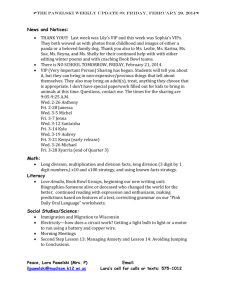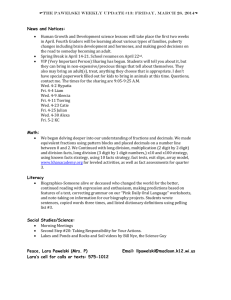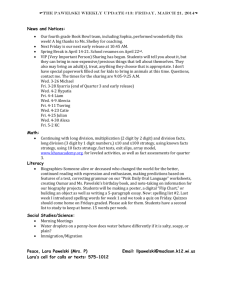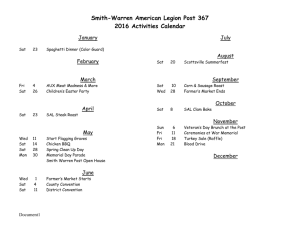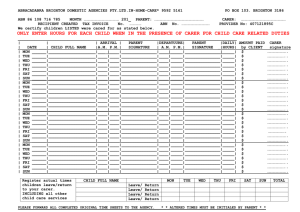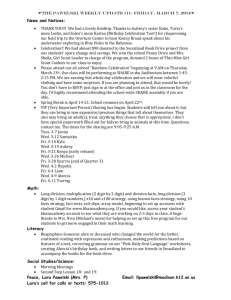Course Objectives - River Valley High School
advertisement
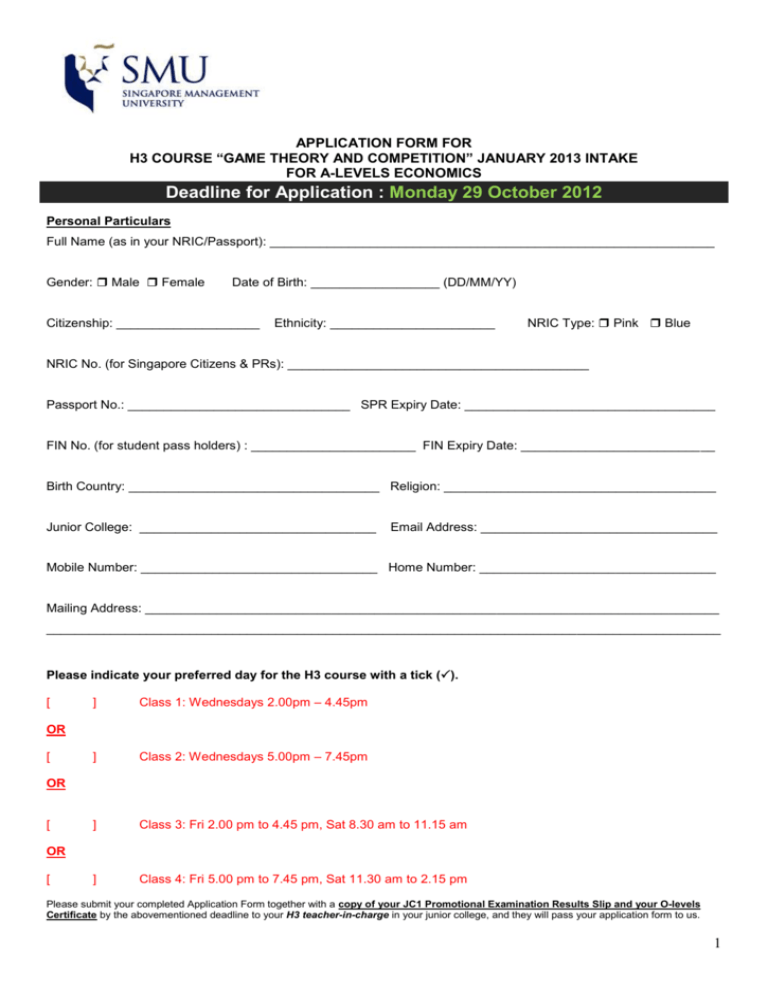
APPLICATION FORM FOR H3 COURSE “GAME THEORY AND COMPETITION” JANUARY 2013 INTAKE FOR A-LEVELS ECONOMICS Deadline for Application : Monday 29 October 2012 Personal Particulars Full Name (as in your NRIC/Passport): ______________________________________________________________ Gender: Male Female Date of Birth: __________________ (DD/MM/YY) Citizenship: ____________________ Ethnicity: _______________________ NRIC Type: Pink Blue NRIC No. (for Singapore Citizens & PRs): __________________________________________ Passport No.: _______________________________ SPR Expiry Date: ___________________________________ FIN No. (for student pass holders) : _______________________ FIN Expiry Date: ___________________________ Birth Country: ___________________________________ Religion: ______________________________________ Junior College: _________________________________ Email Address: _________________________________ Mobile Number: _________________________________ Home Number: _________________________________ Mailing Address: ________________________________________________________________________________ ______________________________________________________________________________________________ Please indicate your preferred day for the H3 course with a tick (). [ ] Class 1: Wednesdays 2.00pm – 4.45pm ] Class 2: Wednesdays 5.00pm – 7.45pm ] Class 3: Fri 2.00 pm to 4.45 pm, Sat 8.30 am to 11.15 am ] Class 4: Fri 5.00 pm to 7.45 pm, Sat 11.30 am to 2.15 pm OR [ OR [ OR [ Please submit your completed Application Form together with a copy of your JC1 Promotional Examination Results Slip and your O-levels Certificate by the abovementioned deadline to your H3 teacher-in-charge in your junior college, and they will pass your application form to us. 1 HIGHER 3 PROGRAMME FOR A LEVEL ECONOMICS ECON 106Z GAME THEORY AND COMPETITION January 2013 Instructor Professor Winston T H Koh Office: #050-033 School of Economics 90 Stamford Road Tel: 6828-0853 Email: winstonkoh@smu.edu.sg Course Objectives Economic agents with divergent objectives and interests often compete against one another in a variety of situations. For instance, companies compete for customers and production rights, countries compete for foreign investments and over trade quotas, co-workers compete for promotions, graduates compete for jobs and contestants on game shows compete for prize money. These agents may have identical or different strategic options open to them and may possess common information and/or private knowledge that could place them at an advantage relative to their rivals. This H3 course builds on the H2 Economics Syllabus for Economics: specifically, Section 1.3 – Firms and How They Operate. The course will introduce students to basic concepts and principles of game theory, with applications to market competition, business and other aspects of economic life. Students will learn the application of a game-theoretic framework to analyze market competition and resource allocation that are directly relevant to the H2 Economics syllabus. Furthermore, they will be able to use the concepts of prisoners’ dilemma, Nash equilibrium and mixed strategies to analyze a wide range of economic problems. This course introduces the students to basic concepts and principles of game theory, with applications to business, politics and social sciences. The course stresses conceptual understanding and problem solving, and will equip students with a better appreciation of the strategic interactions present in different types of economic activities. Course Structure Class-room sessions: 12 lessons starting in January 2012. There will be 4 classes. Please refer to the specific schedule as attached. Assignments and independent study: There will be weekly homework and readings assigned to students for independent study. Students may consult the professor and the teaching assistant to review the material taught in class. Mid-term test: It will be a closed-book test, 2.5 hours in duration, 3 multi-part questions, with structured problems and free-response questions. Final Examination: A closed book written examination (3 hours). It will consist of structured problems and freeresponse questions. 2 Assessment & Evaluation Class participation Mid Term Test Final examination 5% 25% 70% Required Text Avinash K. Dixit, Susan Skeath and David Reiley, Games of Strategy, Third Edition, Norton, 2009 Other Readings and References Avinash K. Dixit and Barry J. Nalebuff, Thinking Strategically, Norton, 1991 Eric Rasmusen, Games and Information: An Introduction to Game Theory, Basil Blackwell, 2007 Thomas C. Schelling, The Strategy of Conflict, Harvard University Press, 1980 Herbert Gintis, Game Theory Evolving, Princeton University Press, 2009 H. Scott Bierman and Luis Fernandez, Game Theory with Economic Applications, 2nd Edition, Addison Wesley, 1998 Joel Watson, An Introduction to Game Theory, Norton, 2008 Robert Gibbons, Game Theory for Applied Economists, Princeton, 1992 Note: All the supplementary references listed above will be made available at the Course Reserve Section, in the SMU Library, for the duration of the course. 3 Course Outline and Schedule for Class 1 (2.00 pm to 4.45 pm) and Class 2 (5.00 pm to 7.45 pm). Venue: Seminar Room 5.2, SOE/SOSS Building. Week Topics 1 16 Jan 2013 (Wed) Strategic Thinking with game theory What is a game of strategy? Rules of the Game Decisions versus tactics 2 23 Jan 2013 (Wed) Game with sequential moves Drawing game trees Backward Induction Rollback equilibrium 3 30 Jan 2013 (Wed) Games with simultaneous moves Nash equilibrium Continuous variables 4 6 Feb 2013 (Wed) Games of dynamic competition Combining sequential and simultaneous moves Applications to business and politics 5 13 Feb 2013 (Wed) Simultaneous-move games with mixed strategies Beliefs and Responses Games with more than two strategies 6 20 Feb 2013 (Wed) The Prisoners’ Dilemma Repeated interactions Applications to Politics, Evolutionary Biology 7 27 Feb 2013 (Wed) Uncertainty and Information Strategies to manipulate information Screening versus signaling 8 2 Mar 2013 (Sat) Mid-term Test – 1.00 pm to 3.30 pm 9 6 Mar 2013 (Wed) Entry Deterrence under Asymmetric Information Separating, Pooling and Semi-separating Equilibrium 10 13 Mar 2013 (Wed) Games with strategic moves Commitment, threats and promises: Applications: US-Japan trade relations Brinkmanship 11 20 Mar 2013 (Wed) Introduction to Auction Theory Private-values auction model Common-values auction model 12 13 April 2013 (Sat) Final Examination Dixit and Skeath Ch 1, 2 Ch 3 Ch 4, 5 Ch 6 Ch 7, 8 Ch 11 Ch 9 Ch 9 Ch 10, 14 Ch 16 4 Course Outline and Schedule for Class 3 (Fri 2.00 pm to 4.45 pm, Sat 8.30 am to 11.15 am) and Class 4 (5.00 pm to 7.45 pm, Sat 11.30 am to 2.15 pm). Venue: Seminar Room 5.2, SOE/SOSS Building. Week Topics 1 5 Jan 2013 (Fri) Strategic Thinking with game theory What is a game of strategy? Rules of the Game Decisions versus tactics 2 25 Jan 2013 (Fri) Game with sequential moves Drawing game trees Backward Induction Rollback equilibrium 3 26 Jan 2013 (Sat) Games with simultaneous moves Nash equilibrium Continuous variables 4 8 Feb 2013 (Fri) Games of dynamic competition Combining sequential and simultaneous moves Applications to business and politics 5 15 Feb 2013 (Fri) Simultaneous-move games with mixed strategies Beliefs and Responses Games with more than two strategies 6 16 Feb 2013 (Sat) The Prisoners’ Dilemma Repeated interactions Applications to Politics, Evolutionary Biology 7 1 Mar 2013 (Fri) Uncertainty and Information Strategies to manipulate information Screening versus signaling 8 2 Mar 2013 (Sat) Mid-term Test – 1.00 pm to 3.30 pm 9 15 Mar 2013 (Fri) Entry Deterrence under Asymmetric Information Separating, Pooling and Semi-separating Equilibrium 10 22 Mar 2013 (Fri) Games with strategic moves Commitment, threats and promises: Applications: US-Japan trade relations Brinkmanship 11 23 Mar 2013 (Sat) Introduction to Auction Theory Private-values auction model Common-values auction model 12 13 April 2013 (Sat) Final Examination Dixit and Skeath Ch 1, 2 Ch 3 Ch 4, 5 Ch 6 Ch 7, 8 Ch 11 Ch 9 Ch 9 Ch 10, 14 Ch 16 5

